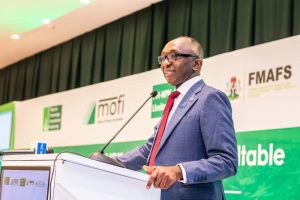
Nigeria’s ambitious drive toward food sovereignty received a major boost on Wednesday as the Federal Government announced sweeping advances in the Presidential Fertilizer Initiative (PFI). Officials say the program’s next phase—PFI 3.0—is set to secure a steady supply of fertilizer, safeguard farmers from global market shocks and strengthen the nation’s agricultural backbone.

In alignment with President Bola Ahmed Tinubu’s food-security vision, the PFI is now laying the groundwork for year-round raw material supply to blending plants across the country. According to the Ministry of Finance Incorporated (MOFI), more fertilizer inputs have already been supplied or ordered in 2025 than in the entire previous year, ensuring that blenders can produce at full capacity.
New figures show that between 2022 and 2025, 48 vessels have delivered critical raw materials for fertilizer blending, including 10 vessels this year alone, accounting for over 560,000 metric tonnes of inputs discharged at Nigerian ports. This steady inflow is designed to keep production lines running and guarantee stability across the fertilizer value chain.

Dr. Armstrong Ume Takang, Managing Director and Chief Executive Officer of MOFI, stressed that PFI 3.0 is not simply about moving larger volumes of product. “We are meticulously building a system that can insulate farmers from global market shocks and instil the confidence needed for long-term agricultural planning,” he said. “PFI is a prime example of public–private collaboration solving complex national challenges. Its future is a testament to Nigeria’s capacity for strategic reform.”
This strategy has already translated into tangible results: over 4.5 million metric tonnes of finished fertilizer were produced between 2021 and 2024, with more than 128 million bags delivered directly to farmers since the initiative began in 2016.
The Fertilizer Producers and Suppliers Association of Nigeria (FEPSAN) credits the initiative for a dramatic surge in domestic blending capacity. “The number of operational blending plants has increased to over 90 nationwide, with a total blending capacity of about 13 million metric tonnes,” said Alhaji Sadiq Kassim, FEPSAN President. “This growth ensures that fertilizer is consistently available to farmers, closer to their farms, and at reduced transportation costs.”
Despite rising fertilizer prices in recent seasons—driven largely by foreign exchange volatility and global raw material costs—PFI leaders say there is no local scarcity and pledge that PFI 3.0 will further stabilize prices through smarter sourcing and stronger governance.

MOFI is preparing to take over operational management of the PFI from the Nigeria Sovereign Investment Authority (NSIA) by November 2025, a move expected to reinforce oversight and efficiency as the program enters its most ambitious stage. Under PFI 3.0, the government plans strategic reforms to ensure nationwide year-round availability, reduce costs, and tighten traceability to curb hoarding and diversion. A central goal is to increase local sourcing of fertilizer inputs, strengthening Nigeria’s agro-industrial base and reducing dependence on unpredictable imports.
Since its launch in 2016, the PFI has revitalized local blending plants, created thousands of jobs across the agricultural value chain, and become a cornerstone of Nigeria’s food security agenda. By guaranteeing farmers timely, affordable access to high-quality fertilizer, the initiative continues to drive higher yields and greater confidence in Nigeria’s march toward self-sufficiency.
As PFI 3.0 takes shape, stakeholders say the program will not only secure fertilizer supply but also empower farmers to plan and invest with certainty, a vital step toward ensuring Nigeria’s farms remain productive and resilient for decades to come.
